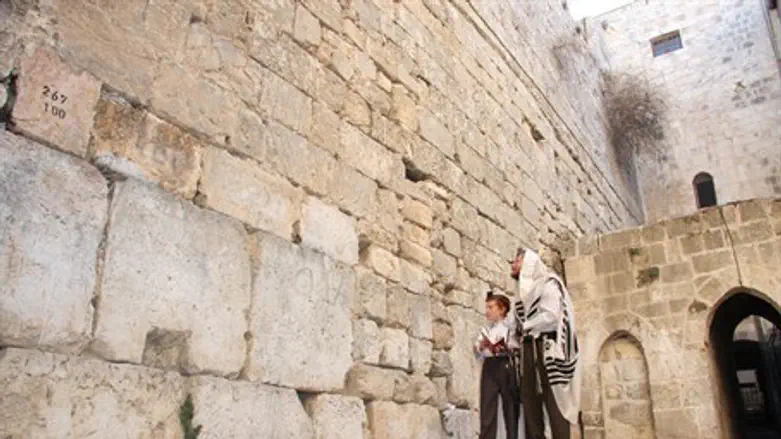
Two Arab teens were offered a plea deal, reducing charges from “violating a holy place” to “disorderly conduct in a public place,” when police decided not to pursue a case against them for urinating on the “Small Kotel,” the Kotel Hakatan.
While most Israelis and tourists are familiar with the Western Wall, the Kotel, and the large plaza that abuts it, the Kotel Hakatan is no less a holy place than the “main” section of the Kotel. Of the nearly 500 meters of length of the Western Wall, roughly 200 meters of the southern end [to the right of the worshipers] are easily accessible today - but the remainder is just as sacred. Another 100 meters or so are included in a tour of the Western Wall Tunnels. Above these tunnels, near the Iron Gate entrance to the Temple Mount and on Temple Mount floor level, is an open area facing a short segment of the Wall. This is the area known as the Kotel HaKatan.
Though it is off the beaten track, the Kotel HaKatan is actually slightly more holy than the familiar Western Wall plaza, because of its closer proximity to the Holy of Holies of the ancient Temples. However, one would not know this upon visiting it - for it is hard to get to, has no trappings of a holy site, and is not even protected 24 hours a day.
Apparently taking advantage of this, Naged Yihya Awad and Wizan Koutini, teenage residents of the Old City, took the opportunity to relieve themselves on the stones of the structure. The incident was captured on police cameras, and the two were arrested for violating the sanctity of a holy place
The incident took place last January, and after a lengthy police investigation, police were ready to prosecute – but in the charge sheet presented to the court last week, the original offense was replaced by a charge of disorderly conduct – a misdemeanor that generally does not carry jail time. The change was the result of a plea bargain, police said.
According to their attorneys, the two did not have malicious intent when they engaged in their act – they simply could not wait, and seeing no one else around, decided that the stones of the Kotel Hakatan would be an appropriate place for them to relieve themselves. The attorneys claimed that the two were unaware that they had violated a holy place, despite the fact that signs in English, Hebrew, and Arabic point this out.
Prosecutors were livid at the police decision. Speaking to the NRG web site, Arnon Yahav, a spokesperson for the Jerusalem Prosecutor's Office, said that “if this was reversed and it was a Jew who urinated on a fence of the Temple Mount, Jerusalem would be in flames right now. But there is no problem when an Arab does this to a Jewish holy site.”
Police said in a statement that each situation was different, and that there were “mitigating circumstances” that prompted it to reduce the charges. “Needless to say, we see violations of holy places as a very serious matter, and as such we recommended in our arrangement that the defendants serve a suspended sentence to ensure that they do not repeat this act.”